‘University for a Day’ On Sept. 15

On Saturday, Sept. 15, The University of Scranton’s Schemel Forum will present its annual University for a Day, which is offered every fall semester. Area residents will be exposed to presentations that examine individualism vs. the common good; how America “remembers” its racial history; the inherent political consciousness of the U.S. Supreme Court; and how Scranton reflected the national art scene from the 1880s to the 1920s.
University for a Day, sponsored by the Frieder Foundation, features four lectures, with ample time for discussion, as well as morning coffee, lunch and a closing reception. The event will run from 8:45 a.m. to 5:30 p.m. in Brennan Hall on campus.
The first lecture begins at 9:30 a.m. with “The Real Road to Serfdom,” presented by Matthew Meyer, Ph.D., associate professor of philosophy and director of the Pre-Law Advisory Program at Scranton. In The Road to Serfdom (1944), Friedrich Hayek, an Austrian economist, argued that using government to realize ideals of social justice and the common good leads to serfdom. Instead, Hayek defended an individualism that rejects the common good, restricts government activity and paves the way for market-based solutions to social problems. Dr. Meyer will ask whether or not the implementation of Hayek's ideas puts us on the real road to serfdom.
Next, at 11 a.m., historian James Campbell, Ph.D., Edgar E. Robinson Professor in U.S. history at Stanford University, will present “Monumental Questions: Race, Memory, and Monument in America Today.” He will explore how Americans remember and represent the country’s racial past, a history that manifestly contradicts the “self- evident” propositions of liberty and equality enshrined in the founding documents.
Mark C. Alexander, J.D., Arthur J. Kania Dean and professor of law at Villanova University’s Charles Widger School of Law, will present “The Supreme Court at the Intersection of Law and Politics.” In theory, the Justices on the U.S. Supreme Court are supposed to be removed from political pressure due to their lifetime tenure. But this protection does not mean that they do not understand politics and do not act in ways that can be described as political. Dean Alexander will explore some examples, trends and ramifications.
The final presentation, “An American Art Story: 1880s to 1920s,” will be delivered at 3:15 p.m. by Josephine Dunn, Ph.D., professor of art history, oral history and European cultural history at Scranton. Dr. Dunn will discuss art as created, exhibited, collected and purchased in America, using Scranton as a microcosm of the national art scene. She will explore Scranton’s early efforts to build an art culture.
Dr. Dunn said, “Post-Civil War America witnessed widespread industrialization; the growth of fast fortunes made by enterprising men and women; and the national map redrawn with a peppering of new cities – including Scranton. The late 19th and early 20th century also generated a remarkable flowering of art, artists, patrons and collectors in thriving older cities like New York, Philadelphia and Boston – and in young, ambitious Scranton.”
Seating is limited and reservations are required to attend the Schemel Forum’s University for a Day program. The participation fee is $25 for non-Schemel Forum members.
To register, contact Alicen Morrison, Schemel Forum assistant, at 570-941-6206 or alicen.morrison@scranton.edu. For more information on Schemel Forum programs and memberships, contact Sondra Myers, Schemel Forum director, at 570-941-4089 or sondra.myers@scranton.edu.
See video here: The Highs & Lows of Crime and Justice in the US: Reforming the Practice of Criminal Justice






